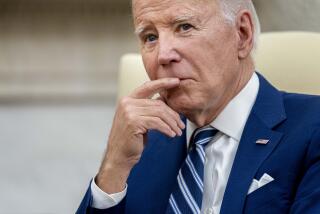China Halts Experiment in Liberalization : Student Unrest Blamed on ‘Bourgeois Thought’
- Share via
PEKING — The Chinese Communist Party on Tuesday effectively ended its seven-month-long experiment with political liberalization and initiated a new campaign of criticism against party members who have encouraged or permitted departures from political orthodoxy.
In a front-page commentary in the party newspaper People’s Daily, the Chinese regime termed the recent wave of student demonstrations serious, major events. It said they were “the result of the spread for several years of bourgeois liberal thought and the fact that some of our comrades have shown weakness in fighting it.”
Deng Quoted Twice
The tone of the commentary made clear that it came from the senior leadership. China’s top leader, Deng Xiaoping, was quoted twice, and Communist Party committees at all levels of the government were ordered to give new importance to the task of opposing “bourgeois liberalization.”
The commentary appeared to signal a major change of direction for the Chinese leadership. The regime stressed that it intends to proceed with its economic reforms and its policy of opening to the outside world. But intellectuals were put on notice that they will not be permitted to explore new political ideas or question the tenets of the Communist Party as they have done in recent months.
‘A Call to Order’
“This is a return to ideological purity, a call to order within the party,” one Asian diplomat said Tuesday. He predicted that the new policy may lead to retaliation against some professors, university officials, newspaper editors and lower-level propaganda officials who are perceived as having “bourgeois liberal” tendencies.
Last spring, high-ranking Chinese leaders such as Politburo member Hu Qili had touched off a period of intellectual ferment by talking vaguely about the need for “political reform.” Since then, many intellectuals have been writing articles suggesting the need for greater tolerance of dissent and a more democratic style of government in China.
In one such essay, for example, a writer named Sha Yexin said last November in a Shanghai newspaper:
“Ideology should be free, emancipated, rich and pluralistic. . . . I have established for myself four basic ideological principles--to shake off ideological bonds, to free myself from following others blindly and from superstition, to think for myself and to help my own ideology eventually jump from the realm of necessity to the realm of freedom.” He called upon readers to “go against one’s superiors without staging a rebellion.”
Tuesday’s commentary warned that the Chinese regime will insist upon rigorous obedience to what are called the “four cardinal principles”--socialism, the dictatorship of the proletariat, the leadership of the Communist Party and the ideology of Marxism, Leninism and the thoughts of Mao Tse-tung.
Those four principles were set forth by Deng in March, 1979--at a time when he was reining in the “democracy wall” campaign, the last serious movement for democracy in China before the recent series of student demonstrations.
Reminiscent of Mao
The Communist Party’s turnaround from encouraging intellectuals to express new ideas to denouncing those who aired them was also reminiscent of the sequence of events in China under Mao’s leadership three decades ago.
In 1956, disturbed by the anti-Communist uprising in Hungary, Mao initiated a “hundred flowers” campaign in which he encouraged Chinese intellectuals to air their criticisms of the party. The campaign drew its name from the saying, “Let a hundred flowers bloom, let a hundred schools of thought contend.”
Mao was quickly stung by the outpouring of dissent, and within only a few months, he launched a new movement, called the “anti-rightist campaign,” in which thousands of intellectuals who had spoken freely lost their jobs or were sent to prison.
Ironically, the call for political reform in China began last spring with the party’s celebration of the 30th anniversary of the “hundred flowers” campaign and a call for intellectuals to explore new ideas once again. At the time, some Chinese intellectuals said privately that they considered the anniversary celebration a cruel joke.
Warning About Measures
There is no sign that intellectuals now will be purged or imprisoned as they were 30 years ago. The People’s Daily commentary carefully warns party officials that “simplistic measures must not be taken.”
But an editorial in another Communist Party organ, the Economic Daily, said that those who ardently promote bourgeois liberalization “should be severely dealt with.”
A main point of the party’s new commentary was to blame the recent student demonstrations for democracy on the intellectuals who have been pressing for political changes and the right to dissent.
“There really is a small handful of people preaching bourgeois liberalism and advocating bringing in capitalism,” the Communist Party newspaper said. “When we talk about economic reform, they want to walk the capitalist path. When we talk about political reform, they want to copy Western capitalism. . . .
“Now it’s time to wake up. Bourgeois liberalism is indeed an ideological trend. It’s in the process of poisoning our youth, imperils our social stability and unity, interferes with our reforms and opening-up policy and obstructs modernization’s move forward. Can we still do nothing about it?”
Conservative Victory Seen
The change of direction amounts to an important victory for conservative forces within the Communist Party and could cloud the future of some leading officials.
The leaders most closely identified with the campaign for political reform were Hu Qili, who heads the party secretariat, and Zhu Houze, the party’s head of propaganda. Neither of the men had himself deviated from party orthodoxy, but both actively encouraged intellectuals to speak out.
The Communist Party will approve a new leadership lineup at its 13th congress next fall. Hu Qili has been considered one of the leading candidates to take over as general secretary of the party.
Although Deng Xiaoping has pushed hard for the causes of modernization and economic reform, he has demonstrated repeatedly throughout his long career a willingness to rein in any dissent that challenges the party’s domination.
In his one public pronouncement on the subject of possible political reform last September, Deng ignored completely the discussion of democracy, the right to dissent, or checks and balances upon the power of the Communist Party.
‘Good at Leadership’
Political reform, he said, means that “our party should be good at leadership.”
In another indication of the new political direction, the New China News Service suggested that university students may soon be headed for a return to the sort of political-study courses that have been downgraded in recent years.
The news service said that a recent study has shown that “proper guidance is needed to cultivate political consciousness” among young university students.
“Therefore, universities should educate young students in the theories of Marxism and Leninism and help them establish their own sound judgments instead of letting them blindly following the issues,” the news service said.
More to Read
Sign up for Essential California
The most important California stories and recommendations in your inbox every morning.
You may occasionally receive promotional content from the Los Angeles Times.













